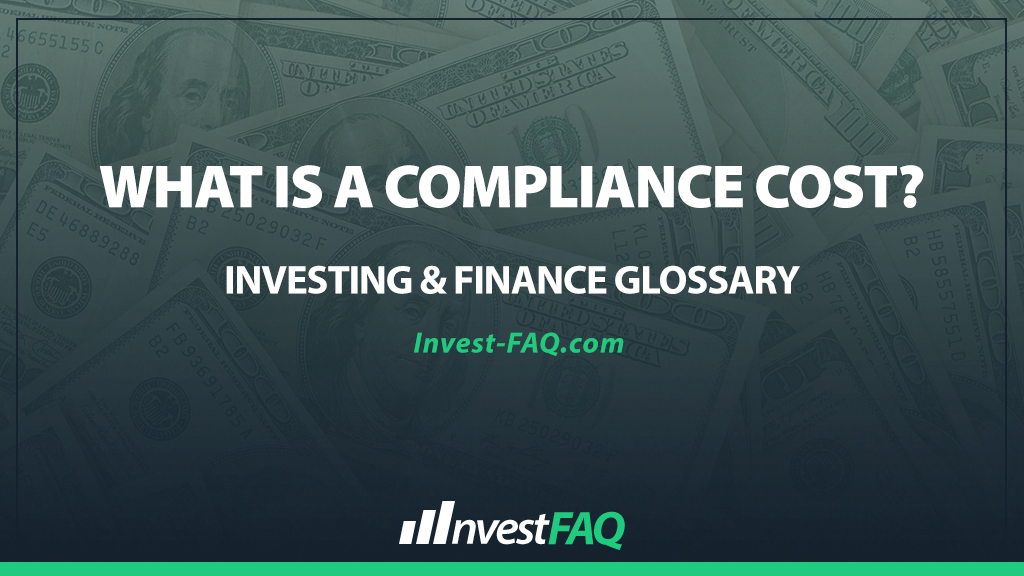
Compliance Cost
Contents
A compliance cost refers to the expenses that a business incurs to adhere to industry regulations, legal requirements, and standards. These costs include expenditures on administrative processes, reporting, system upgrades, employee training, and external audits to ensure regulatory compliance.
Compliance costs are a significant consideration for businesses across sectors, impacting financial planning and operational efficiency.
While these costs can be substantial, they are essential for legal operation, maintaining industry standards, and avoiding penalties.
Companies invest in compliance to safeguard their reputation, sustain operations, and provide assurance to stakeholders about their commitment to ethical practices and legal standards.
Example of a Compliance Cost
“GreenManufacture Inc.,” operates in the environmental sector and is subject to stringent environmental regulations. To comply with the latest regulations, the company incurs various costs, including:
$20,000 for environmental impact assessments
$15,000 for updating pollution control technologies
$10,000 for training employees on new environmental compliance procedures
$5,000 for certifying compliance through an external auditor
Total Compliance Cost: $50,000
In this scenario, “GreenManufacture Inc.” incurs a total of $50,000 in compliance costs, which are essential for maintaining its operational license and market reputation.
The investments in technology upgrades and employee training not only ensure compliance with current environmental regulations but also position the company as a responsible industry participant.
Although these costs directly impact the company’s financial statements, reducing net income in the short term, they are crucial for long-term sustainability and can prevent much higher costs associated with non-compliance, such as fines and operational disruptions.
Significance for Investing & Finance
The significance of compliance costs in accounting and business management includes:
Financial Planning and Budgeting: Accurately estimating and tracking compliance costs is essential for effective financial planning and budgeting. These costs can represent a significant portion of operational expenses, influencing profitability and investment decisions.
Risk Management: Compliance costs are a critical component of a company’s risk management strategy. By investing in compliance, businesses mitigate the risk of legal penalties, reputational damage, and potential business interruptions.
Transparency and Reporting: Properly accounting for compliance costs enhances transparency in financial reporting, providing clear insights to stakeholders about the company’s commitment to regulatory adherence and ethical practices.
Strategic Advantage: Companies that efficiently manage compliance costs can gain a competitive advantage. Effective compliance strategies can improve operational efficiencies, enhance brand reputation, and open up new market opportunities.
In summary, compliance costs represent a necessary investment for businesses to operate legally, maintain industry standards, and fulfill social responsibilities.
Accurate accounting and management of these costs are crucial for financial planning, risk management, and demonstrating a company’s commitment to compliance. While they may impact short-term profitability, they are essential for safeguarding long-term success and sustainability.
FAQ
What encompasses compliance costs for a business?
Compliance costs include all expenses a business incurs to adhere to industry regulations and laws, covering expenditures on regulatory filings, compliance audits, system upgrades for legal compliance, and staff training.
How can compliance costs impact small businesses differently than larger corporations?
For small businesses, compliance costs can represent a significant portion of their budget, potentially hindering growth due to the fixed nature of many regulatory expenses, whereas larger corporations can spread these costs over a larger revenue base, lessening the per-unit impact.
Are compliance costs tax-deductible?
Generally, compliance costs are considered ordinary and necessary business expenses, making them tax-deductible, although the specifics can vary depending on the jurisdiction and the nature of the expenses.
Can investing in technology reduce long-term compliance costs?
Investing in technology, such as compliance management software, can reduce long-term compliance costs by automating routine compliance tasks, improving accuracy, and minimizing the risk of non-compliance penalties.
